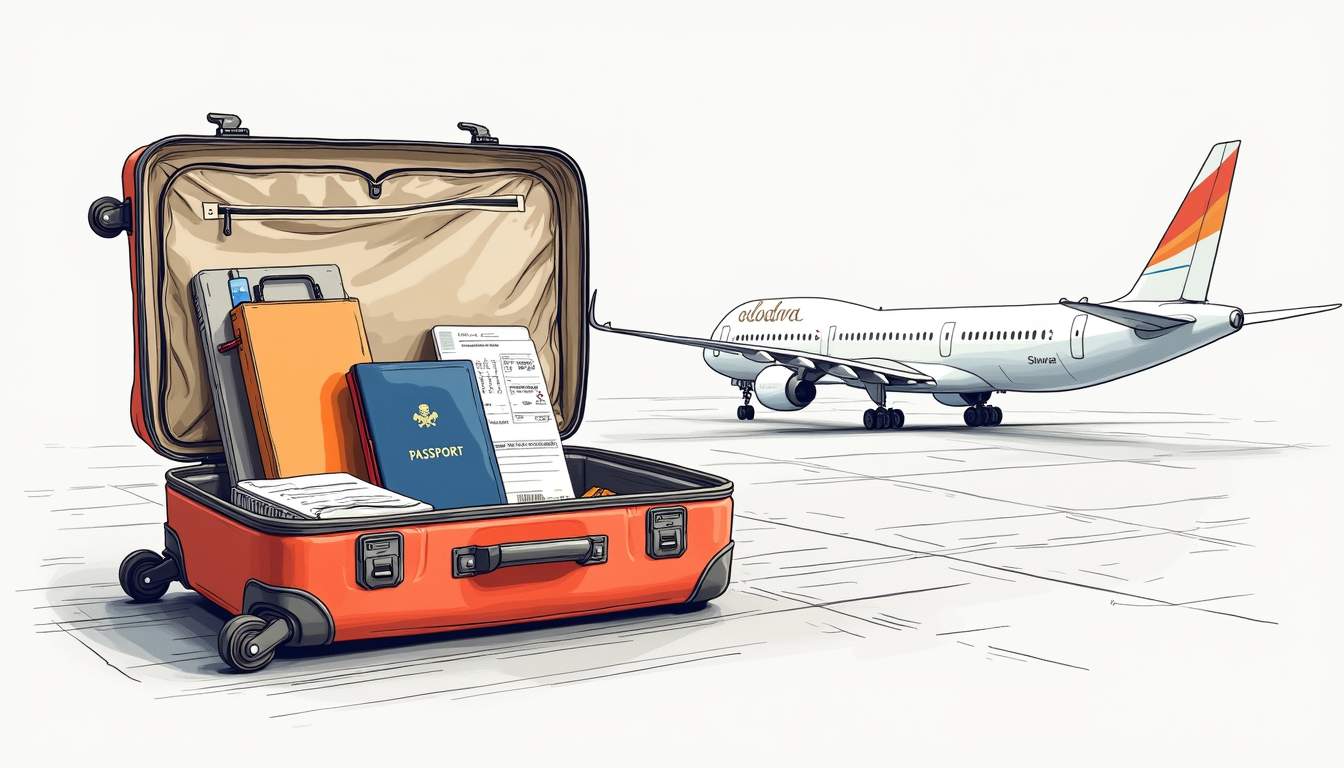In today’s fast-paced world, the demand for quick and efficient delivery services has never been higher. Among various delivery methods, onboard couriers have carved out a unique niche, offering a personal touch to the logistics of transporting goods. This guide will explore what it takes to become an onboard courier, the skills required, and the opportunities that await those who choose this dynamic career path.
Understanding the Role of an Onboard Courier
Onboard couriers are individuals who accompany shipments on flights, ensuring that valuable or time-sensitive items reach their destination safely and promptly. Unlike traditional couriers, onboard couriers travel with the cargo, providing an extra layer of security and assurance for high-value items. This role has become increasingly important in industries such as pharmaceuticals, electronics, and luxury goods, where the integrity and timeliness of delivery can significantly impact business operations and customer satisfaction.
The role of an onboard courier is multifaceted. It involves not only the physical act of transporting goods but also managing documentation, ensuring compliance with customs regulations, and maintaining communication with clients and logistics teams. This position requires a unique blend of skills and a deep understanding of the logistics industry. Couriers must also stay informed about global shipping trends and regulations, as these can change frequently and impact their operations.
Key Responsibilities
Onboard couriers have a range of responsibilities that go beyond simply carrying a package. They must prepare and verify shipping documents, coordinate with airlines for flight arrangements, and handle customs clearance procedures. Attention to detail is crucial, as missing paperwork can lead to significant delays or complications. Furthermore, onboard couriers often need to perform risk assessments to determine the best routes and methods for transporting sensitive items, ensuring that they are safeguarded throughout the journey.
Additionally, onboard couriers must maintain a high level of professionalism and customer service. They often interact directly with clients, providing updates and addressing any concerns. This aspect of the job is vital, as it helps build trust and ensures a smooth delivery process. In some cases, couriers may also be responsible for conducting pre-flight inspections of the cargo to ensure that all items are securely packed and labeled correctly, which minimizes the risk of damage during transit.
Skills Required
To succeed as an onboard courier, several key skills are essential. First and foremost, strong organizational skills are necessary to manage multiple shipments and deadlines effectively. Couriers must also possess excellent communication skills, as they frequently liaise with various stakeholders, including clients, airline staff, and customs officials. The ability to articulate complex information clearly and concisely is crucial, especially when navigating the intricacies of international shipping laws and regulations.
Moreover, adaptability is crucial. The logistics industry can be unpredictable, with last-minute changes in flight schedules or customs regulations. Being able to think on one’s feet and adjust plans accordingly is a valuable trait for onboard couriers. Additionally, a solid understanding of technology is increasingly important, as many couriers now utilize tracking software and mobile applications to monitor shipments in real-time, providing clients with up-to-date information and enhancing overall service delivery. This tech-savvy approach not only streamlines operations but also fosters a more transparent relationship with clients, reinforcing the courier’s role as a vital link in the supply chain.
Getting Started: Qualifications and Training
While formal education is not always a strict requirement for becoming an onboard courier, certain qualifications can enhance one’s prospects in this competitive field. A background in logistics, supply chain management, or international business can provide a solid foundation for understanding the complexities of the industry. Knowledge of international trade laws and cultural nuances can also be a significant asset, as these factors often influence shipping processes and customer interactions.

Many couriers also benefit from specialized training programs that focus on customs regulations, shipping documentation, and security protocols. These programs equip aspiring couriers with the knowledge they need to navigate the intricacies of international shipping. Furthermore, understanding the technological tools used in logistics, such as tracking systems and inventory management software, can streamline operations and enhance efficiency, making candidates more appealing to employers.
Certifications and Courses
Obtaining certifications related to logistics and transportation can significantly boost one’s credibility as an onboard courier. Various organizations offer courses that cover essential topics such as air cargo operations, hazardous materials handling, and customs compliance. Completing these courses demonstrates a commitment to professionalism and can make an individual more attractive to potential employers. Additionally, certifications in areas like project management or customer service can further distinguish a courier in a crowded job market, showcasing a well-rounded skill set.
In addition to formal training, gaining practical experience through internships or entry-level positions in logistics companies can provide valuable insights into the day-to-day operations of the industry. This hands-on experience is often invaluable for understanding the nuances of being an onboard courier. Engaging with seasoned professionals in the field can also foster mentorship opportunities, allowing newcomers to learn best practices and industry secrets that are not typically covered in formal education. Networking within the logistics community can lead to job opportunities and collaborations that might not be available through traditional job-searching methods.
Finding Opportunities as an Onboard Courier
The demand for onboard couriers is growing, driven by the increasing need for expedited shipping solutions. Numerous companies, ranging from specialized logistics firms to large multinational corporations, regularly seek onboard couriers to meet their shipping needs.
Networking is a powerful tool in this industry. Attending logistics conferences, joining professional organizations, and connecting with industry professionals on platforms like LinkedIn can open doors to job opportunities. Building a strong professional network can lead to referrals and recommendations that may not be advertised publicly.
Job Search Strategies
When searching for onboard courier positions, it’s essential to utilize various job search strategies. Online job boards, company websites, and recruitment agencies specializing in logistics can be excellent resources for finding openings. Tailoring resumes and cover letters to highlight relevant skills and experiences is crucial to standing out in a competitive job market.
In addition to traditional job search methods, considering freelance or contract opportunities can provide flexibility and a chance to gain experience. Many companies are open to hiring independent couriers for specific shipments, allowing individuals to build their portfolios while working on their terms.
The Day-to-Day Life of an Onboard Courier
The daily routine of an onboard courier can vary significantly based on the nature of the shipments and the destinations involved. Typically, couriers begin their day by reviewing their assignments, which may include multiple shipments across various locations.

Once the shipments are prepared, couriers head to the airport, where they must go through security checks and ensure that all documentation is in order. This part of the job can be time-consuming, especially during busy travel periods, so planning ahead is essential.
Travel and Logistics
Traveling is a significant aspect of being an onboard courier. Depending on the shipment, couriers may find themselves flying domestically or internationally, often on short notice. This travel can be exciting, as it offers the chance to explore new places, but it also requires flexibility and the ability to adapt to changing schedules.
Logistics management is another critical component of the job. Couriers must keep track of their shipments, monitor flight statuses, and coordinate with receiving parties to ensure a smooth handoff. This level of organization is vital to maintaining the integrity of the delivery process.
Challenges Faced by Onboard Couriers
While being an onboard courier can be rewarding, it is not without its challenges. One of the most significant hurdles is the unpredictability of travel. Flight delays, cancellations, and changes in customs regulations can all impact delivery timelines, requiring couriers to think quickly and adapt to new circumstances.
Additionally, the nature of the items being transported can pose challenges. Couriers may be responsible for high-value or sensitive materials, which require extra care and attention. Ensuring the safety and security of these items is paramount, and any missteps can lead to serious consequences.
Maintaining Professionalism
Given the high stakes involved in transporting valuable goods, maintaining professionalism is crucial for onboard couriers. This includes adhering to strict timelines, communicating effectively with clients, and handling any issues that arise with grace and composure.
Building a reputation for reliability and professionalism can lead to repeat business and referrals, making it essential for couriers to consistently deliver exceptional service. Developing strong relationships with clients and stakeholders can also help navigate challenges more effectively.
The Future of Onboard Couriers
The logistics industry is continually evolving, driven by advancements in technology and changing consumer demands. As e-commerce continues to grow, the role of onboard couriers is likely to expand, with more companies seeking expedited delivery solutions.
Innovations such as drone delivery and automated logistics processes may also impact the future of onboard couriers. While these technologies may change the landscape, the personal touch and reliability offered by human couriers will remain invaluable, particularly for high-value or sensitive shipments.
Embracing Change
To thrive in this evolving environment, onboard couriers must be willing to embrace change and adapt to new technologies. Staying informed about industry trends and advancements can help couriers remain competitive and relevant in the job market.
Additionally, ongoing education and training will be essential for those looking to advance their careers. By continuously improving their skills and knowledge, onboard couriers can position themselves as valuable assets to their employers and clients.
A Rewarding Career Path
Becoming an onboard courier offers a unique and rewarding career path for those who enjoy travel, logistics, and working in a dynamic environment. With the right skills, qualifications, and a proactive approach to finding opportunities, aspiring couriers can carve out a niche in this exciting field.

As the demand for efficient delivery solutions continues to grow, the role of onboard couriers will remain vital. By understanding the responsibilities, challenges, and opportunities within this profession, individuals can embark on a fulfilling journey that combines adventure with professional growth.


